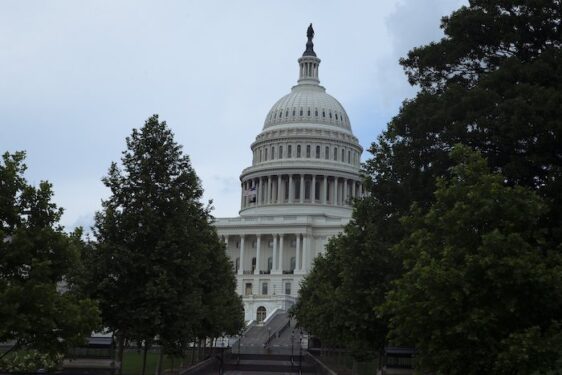NEW YORK — The U.S. bishops conference on Tuesday, Aug. 10, applauded the U.S. Senate passing the Infrastructure Investment and Jobs Act for how it “affects those on the margins of society” and looks to protect the environment.
“Aware that our environmental challenges are too big for any one bill, we are pleased that the legislation reflects an integral ecology, with historical investments in public transit, rail, bridges, and clean drinking water, and emphases on climate change mitigation, carbon capture and climate resilience,” said Archbishop Paul Coakley of Oklahoma City, chairman of the USCCB Committee on Domestic Justice and Human Development in a statement.

The $1.2 trillion infrastructure package passed the U.S. Senate by a bipartisan 69-30 vote, with 19 Republicans joining all Democrats on Tuesday. It now goes onto the House of Representatives for approval once it returns from recess on Sept. 20.
“This landmark piece of legislation will create jobs, increase productivity, and pave the way for decades of economic growth and prosperity,” the 10 senators who crafted the bill, led by Republican Rob Portman of Ohio and Democrat Krysten Sinema of Arizona, said in a statement.
Despite a push from Democrats to do away with the Hyde Amendment — a longstanding provision that prohibits taxpayer funding of abortion — the Senate adopted an amendment around 11 p.m. Tuesday to preserve it in the $3.5 trillion budget resolution. In a near partisan 50-49 vote, Democrat Joe Manchin joined all of the Republicans in voting for the pro-life measure.
More than $550 billion of the infrastructure package is new spending that comes in part from unused COVID-19 relief funds and unused federal employment aid. The bipartisan group of 10 senators also touted that the plan will not raise taxes on everyday Americans or increase inflation.
President Joe Biden, the nation’s second Catholic commander-in-chief, commended the bipartisan effort to get the legislation passed.
“Today, we proved that democracy can still work,” Biden said Tuesday. “We can still come together to do big things, important things, for the American people.”
The $550 billion includes $110 billion for roads and bridges, $66 billion for railroads, $39.2 billion for public transit, $65 billion for broadband, $54 billion for water infrastructure, and $65 billion for the improvements to the power grid.
There is also funding allotted for resiliency — cybersecurity, flood mitigation, wildfire, drought, coastal resiliency, waste management — electric vehicle charging and low-carbon and zero-emission school buses and ferries.
After the passage of the Infrastructure Investment and Jobs Act, the Senate quickly voted to open debate on a $3.5 billion budget resolution.
If both chambers of Congress ultimately adopt the resolution, it paves the way for Democrats to pass a comprehensive spending plan, or “social safety net,” through reconciliation, which allows legislation related to spending, revenues, and the federal debt limit by a simple majority.
Key points of the budget resolution, published by Senate Democrats on Monday, Aug. 9, include investments for families, like universal preschool and free community college, climate, infrastructure and jobs, immigration, and healthcare.
In his statement on Tuesday — published before the vote to preserve the Hyde Amendment — Archbishop Coakley reiterated the USCCB stance that taxpayer funding of abortion be excluded from any government proposals.
“We continue to be resolute in our insistence that no taxpayer funding go to abortion,” Archbishop Coakley said. “It is critical that any proposal to expand health care coverage avoid an expansion of taxpayer funding of abortion.”
The archbishop also outlined a number of areas the USCCB hopes Congress “will continue working together to address” that was first mentioned in a USCCB letter to Congress in April.
These include: An investment in housing and rental assistance, an expansion of the Earned Income Tax Credit, a permanently refundable Child Tax Credit, expanding access to in-home care for family members, affordable childcare options, paid sick leave, parental leave, a path to citizenship for Dreamers, Temporary Protected Status recipients, migrant agricultural workers, and other undocumented essential workers. Plus, universal access to affordable healthcare.
As of Tuesday, Aug. 10, a USCCB petition to save the Hyde Amendment was still active. The petition, which has gathered over 145,000 signatures, is available at notaxpayerabortion.com.
